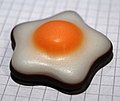Confectionery

Confectionery ( Latin confectum , 'the prepared') is a general term for fine sugar and baked goods such as candied fruit , praline-like products (chocolate content below 25%), fondants , etc. In Austria and Switzerland it is a collective term for small baked goods .
Word origin pharmacist language
The word, which has been used in today's meaning since the 16th century, comes from the language of pharmacists. Since the 15th century it was used for compound drugs for internal use, which - similar to Electuary to - preservation were prepared with honey, sugar or syrup or boiled and then dried.
Confection was approved by the then new in the German area guild of gingerbread made.
Confectionery and baked goods
Today, confectionery is understood to mean small “fine sugar and baked goods” (small baked goods). They are made by the confectioner or pastry chef and sold in a pastry shop . The collective term for confectionery is confectionery . These include petit four , marzipan confectionery , candied fruits , fondants and much more.
Web links
See also
Individual evidence
- ^ Josef Loderbauer: The confectioner's book in learning fields . Verlag Handwerk und Technik, Hamburg 2009, ISBN 978-3-582-40203-5 .
- ↑ Willem F. Daems: dosage forms. In: Lexikon des Mittelalters , I, Sp. 1094-1096, here: Sp. 1094 f.





